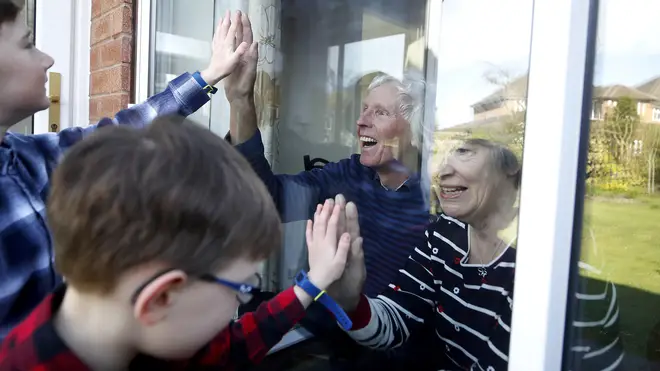
Matt Frei 10am - 1pm
16 February 2021, 14:00 | Updated: 16 February 2021, 22:41

Around 1.7 million more people are being added to the Covid-19 shielding list in England, after experts identified more factors which put them at serious risk.
Letters will be arriving imminently telling people they should be in the coronavirus shielding group - meaning they will need to remain in their homes until 31 March.
Those newly identified as being at higher risk because of multiple factors, including underlying health conditions, will get priority access for vaccines, officials confirmed.
Read more: Covid deaths down by 13% in a week in first fall since Christmas
It is understood only 800,000 of these people will be given priority access to a vaccine.
The list was expanded after scientists developed a new tool which assesses whether someone is at risk of severe disease or death.

Vaccines Minister explains the next stage of the jab programme
The tool looks at multiple factors including age, ethnicity, body mass index (BMI), other health conditions and also postcode, which is indicative of levels of deprivation.
The predictive risk model was developed by researchers led by scientists at Oxford University.
Around 2.2 million people are currently on the list in England, many of whom were identified for a single reason, such as specific cancers, people on immunosuppression drugs or those with severe respiratory conditions.
Read more: Covid-19 - Four fined £10,000 after not declaring travel from red list countries
The additional 1.7 million will bring the number on the list to almost four million.
Some will have already been offered a Covid-19 jab, officials said, but those who have not will be able to get their vaccines "as quickly as possible".
Officials will be advising that shielding continues until March 31, said Dr Jenny Harries, deputy chief medical officer for England.

Nadhim Zahawi: We're not planning to have vaccine passports
She said the group, if they join the list, will receive the additional support available to those deemed to be clinically extremely vulnerable, including medicine deliveries, priority slots for supermarkets and statutory sick pay.
Dr Harries told a briefing for journalists: "We have a new, evidence-based, data-driven, predictive risk model which allows us to identify adults with multiple risk factors that make them more vulnerable to Covid-19.
"We can now identify additional people and help protect them now and in the future.
"All of these people who are identified for the first time are those who have not had an individual clinical condition that we've previously been able to identify through the clinically extremely vulnerable group, but they are people who have multiple personal risk factors and underlying health conditions which move them into a higher risk group.
"As we learn more about Covid-19, we're continuously reviewing the evidence... it was very clear that not all of those individuals who were at risk were identified by the binary approach.
"The model that is used combines a number of underlying risk factors. And those factors include specific health conditions, and some treatments which, for example, put your immune system at risk.
"Age, which is the highest risk factor, sex, ethnicity, body mass index and your postcode, which will also link to a deprivation score.
"It provides a weighted cumulative risk of serious outcomes from Covid-19, and therefore allows us to prioritise these individuals for vaccination, and to give them appropriate advice.
"And the easiest way for us to do that is to include them on the shielded patient list."
Dr Harries said the approach was "risk averse" to "protect as many people as possible".
"The letter will note that this is more likely to be an overestimate of risk in a way which hopefully handles any of their anxiety," she said.
"And it makes it absolutely clear that it is a choice for them if they choose to follow shielding advice or not - that has always been the case.
"What it does also do - which I hope will benefit them, which is why people will hopefully be grateful to receive this - is it will prioritise them for vaccination.
"In addition to that it means they have advice and support and that is important not just now, but should there be any changes in the pandemic in forthcoming months - for example, perhaps in vaccinations perhaps in the autumn as we go forward, then clearly they will be identified within that group as well so there are current and longer term benefits."